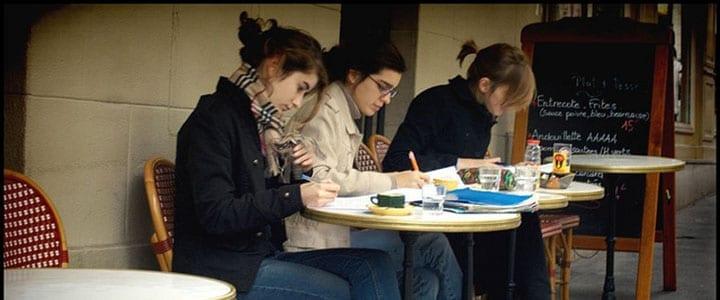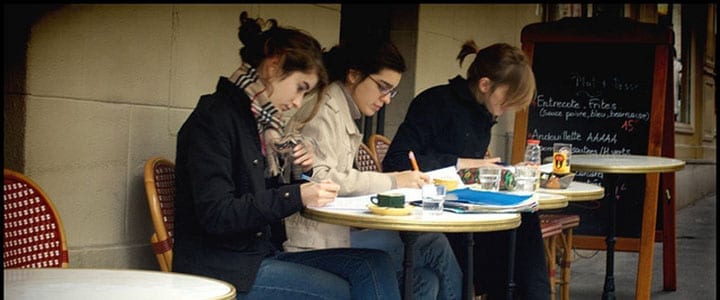French verbs throwing you for a loop? French tutor Carol Beth L. breaks down the differences between the most common verb tenses you’ll study in French class…
French verbs can be a difficult aspect of learning French for many students – but it doesn’t have to be. If you can mentally organize what kinds of verbs are out there and when to use them, learning French grammar will be much easier to do. Here are the most common tenses studied in typical French grammar classes:
Check out our Ultimate French Verb Guide to learn more!
1) Le Présent (The Present Tense)
This tense grammatically corresponds to the English simple present, e.g. “I do,” “he goes,” “we eat.” In English, this tense is used to talk about states of being and regular, repeated actions that are in or include the present time. Le present in French often plays this role, but it also plays a role similar to the present perfect in English – J’y vais for “I am going (there)” or Je mange maintenant for “I am eating now.”
2) Le Passé Composé (The Past Tense)
This tense usually corresponds to the simple past in English. It describes one-time events and actions, or things for which a definite time or time period can be defined.
- Je suis allé(e) au parc. – I went to the park.
- J’ai fait mes devoirs hier soir. – I did my homework last night.
3) L’imparfait (The Imperfect Tense)
The imperfect tense is also in the past, but unlike the passé composé, it describes events that happened repeatedly or over a long period of time.
- J’allais au parc tous les jours. – I went/used to go to the park every day.
- Elles étudiaient a l’université pendant quatre ans. – They studied at the university for four years.
Do not use l’imparfait in reference to an action to which you attach any description or reference to a specific time, such as an hour, year, month, week, or other time reference like “yesterday,” “today,” or “tomorrow.”
4) Le futur (The Future Tense)
This tense corresponds fairly well to the English future tense, formed with the modal “will” plus the verbal root. It describes events that have not yet taken place but are expected to occur.
- J’irai en France la semaine prochaine. – I will go to France next week.
- On mangera ensemble. – We will eat together.
5) Le conditionnel (The Conditional Tense)
The conditionnel describes actions or events whose occurrence depends (or would have depended) on something else. The “if” is key here. If there is no condition (provided by the “if” clause), there is no conditional in the other half of the sentence, either. You may see the conditional tense use in the present (e.g. “I would do something if something were different”) or the past (e.g. “I would have done this same something in the past if something were different”). The other part of the sentence usually uses l’imparfait.
Present Conditional:
- Je viendrais a la plage si mes amies voulaient venir. – I would go to the beach if my friends wanted to come.
Past Conditional:
- Je serais venu(e) a la plage si mes amies auraient voulu venir. – I would have gone to the beach if my friends had wanted to come.
- J’aurais mangé la pomme si elle avait ete mure. – I would have eaten the apple it if had been ripe.
6) Le subjonctif (The Subjunctive Tense)
This is notoriously one of the most difficult tenses for native English-speakers to learn. We do technically have the subjunctive in English, but we don’t use it much. Le subjonctif is used at times when the topic at hand is clouded or influenced by emotion. If you see the word qu’ introducing the sentence’s dependent clause, that is a signal that you likely need to use le subjonctif.
- Je souhaite qu’il vienne avec moi. – I wish him to come with me.
- Nous voulons que vous partiez. – We want you to leave.
- On aimerait qu’ils attendent. – We would like them to wait.
Be careful not to assume that que always implies le subjonctif, however. If the topic at hand is of definite certainty, le subjonctif is not called for. For example:
- C’est vrai qu’on est allé en France cet été. – It is true that we went to France this summer.
7) Le passé simple (The Simple Past or Preterite)
Le passé simple is a literary past tense in French. It used to be found more often in common speech, but for about the last century or so, it has more frequently been used in fiction. In modern times, some writers have begun to prefer more colloquial verb tenses found in everyday spoken language. Unless you plan to write fiction in French, recognition is more important. If you can recognize the passé simple of the most irregular French verbs (which are also the most common), then you will likely also be able to recognize other regular verbs based on their roots.
- Les étudiants parlèrent de leurs idées philosophiques. – The students spoke of their philosophical ideas.
- Elle vit son frère l’approcher. – She saw her brother approaching.
These are the primary verb tenses you will encounter in your study of French grammar. You may see what appear to be combinations or re-combinations of these tenses as part of the pluparfait (past of the past), passé antérieur (literary pluparfait), or French’s other complex tenses. French grammar also has a unique grouping of verbs called reflexive verbs that require special attention, especially when it comes to gender agreement. Mastering the seven tenses above, however, will greatly increase your proficiency and provide you with verbal functionality in the French language.
For more help studying French grammar, working with a private tutor is the best way to get targeted, specific instruction and achieve your language goals. Tutors are available to work with you online via Skype or in-person depending on locations and availability. Search for your French tutor now!

Carol Beth L. teaches French lessons in San Francisco, CA. She has her Masters in French language education from the Sorbonne University in Paris and has been teaching since 2009. Learn more about Carol Beth here!
 Photo by Arslan
Photo by Arslan
Suzy S.


